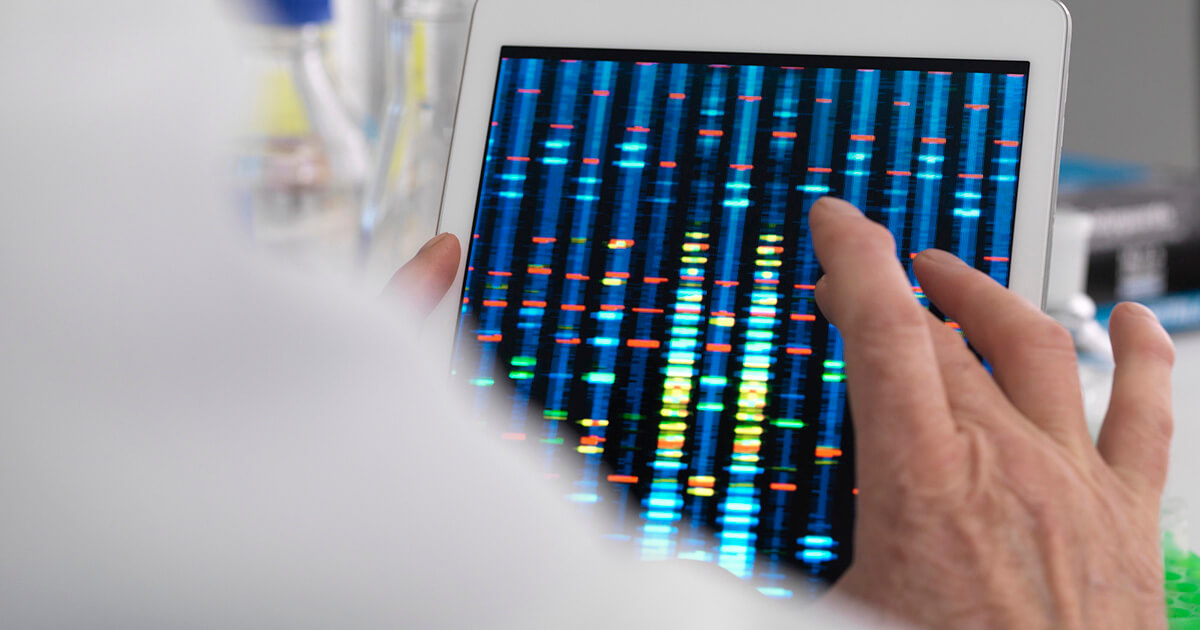Understanding Genetic Testing

How much do you really know about health problems that may run in your family? Are there any that may affect you now or in the future? Or that may affect your children? Genetic testing can help people and their healthcare providers make more informed health care decisions. But there are some potential limitations of genetic testing to be aware of, too. Read on to learn more.
The background: What are genes/chromosomes?
Genes are found in chromosomes, which are located inside cells. Genes are the “instructions” that tell our bodies how to develop and function. They determine your physical traits, such as hair and eye color, how tall you are, even how you smile. They also determine your blood type and the likelihood of developing illnesses. Genes also carry information of medical characteristics that are passed down from your parents. You randomly get one set of 23 chromosomes from your mother and one set of 23 chromosomes from your father.
What is genetic testing?
Sometimes we have a change in one or more of our genes. This change is called a mutation. It can cause a number of medical conditions called genetic disorders. Examples of genetic disorders include Down syndrome (changes in the normal development of a person’s body and brain), sickle cell disease (which causes a severe form of anemia), and Turner syndrome (which leads to heart defects and growth issues in women).
Genetic testing involves laboratory testing of a person’s genes. The testing is done on a sample of blood, hair, skin, amniotic fluid (the fluid that surrounds a pregnant woman’s unborn baby), or other tissue from the body. The tests can show changes in genes that could increase the likelihood of certain genetic disorders.
There are several types of genetic tests that are used for different reasons. For example:
- Predictive and pre-symptomatic genetic tests are used to identify gene changes that may increase a person’s risk of getting certain diseases.
- Diagnostic testing is used to identify the disease a person has.
- Carrier testing is used to find out if a person has a gene change that they can pass along to his or her children even though the carrier may not show signs of having the disease.
- Prenatal testing can help identify certain diseases in babies before they are born.
What are the benefits and limitations of genetic testing?
Genetic testing offers important, potentially life-saving benefits. These include helping healthcare providers and patients:
- Know if a person has a genetic disorder.
- Determine a person’s chance of developing a genetic disorder.
- Determine if a person might pass on a genetic disorder to his or her children.
Genetic testing can also:
- Help you and your healthcare provider make informed decisions about managing your health.
- Help a person to make decisions about having children.
- Identify genetic disorders early so that treatment can begin sooner.
However, there are some limitations to genetic testing that people should be aware of. For example:
- A positive result doesn't always mean a person will develop a disease.
- Healthcare providers can’t always use the results to know how a person’s body will respond to a disease or how severe it will be.
- At-home genetic tests are becoming widely available. It’s important to understand that people may interpret the results of these tests on their own, which can lead them to make healthcare decisions based on incomplete information. Speak with a healthcare provider before using an at-home genetic test.
Having open, honest conversations with a healthcare provider is a critical step for anyone weighing the benefits and limitations of genetic testing. It’s important to ask questions both before and after the test about what the results may mean.
Genetic testing doesn’t provide a complete picture of a person’s health. The risk of developing many illnesses is impacted by other genetic and environmental factors, as well as by medical history, lifestyle choices, and family history. Healthcare providers will take these factors into consideration when deciding what next steps may be needed.
Things to consider before having a genetic test
The decision to test is personal and complex. Some people like to have as much information as possible, but others may not want to know more than they need to. Here are some things to ask yourself and consider before proceeding:
- What will you do once you have the results? Will you have enough information to make a decision? Keep in mind that just because you have a genetic risk does not mean you will develop the disease.
- Can the results cause feelings of anger, depression, anxiety, guilt, stress or worry?
- How accurate is the genetic test?
- How will the results affect your family? The results of the test may reveal that other family members are at risk for health issues. Will it be disturbing for them or cause tension with the family?
- Could having a known genetic condition impact insurance coverage? This is something that should be considered before testing.
References
- 1. National Institutes of Health: National Human Genome Research Institute. Chromosome Abnormalities. Accessed July 10, 2017.
- 2. Centers for Disease Control and Prevention. Genetics Basics. Accessed August 24, 2017.
- 3. MedlinePlus. Genetic Disorders. Accessed July 10, 2017.
- 4. National Institutes of Health: National Human Genome Research Institute. Frequently Asked Questions About Genetic Testing. Accessed July 10, 2017.
- 5. Genetics Home Reference. Lister Hill National Center for Biomedical Communications. U.S. National Library of Medicine. National Institutes of Health. Department of Health & Human Services. Help Me Understand Genetics: Genetic Testing. Published June 6, 2017.
- 6. Kidshealth.org. What is a gene? Accessed October 4, 2017.
